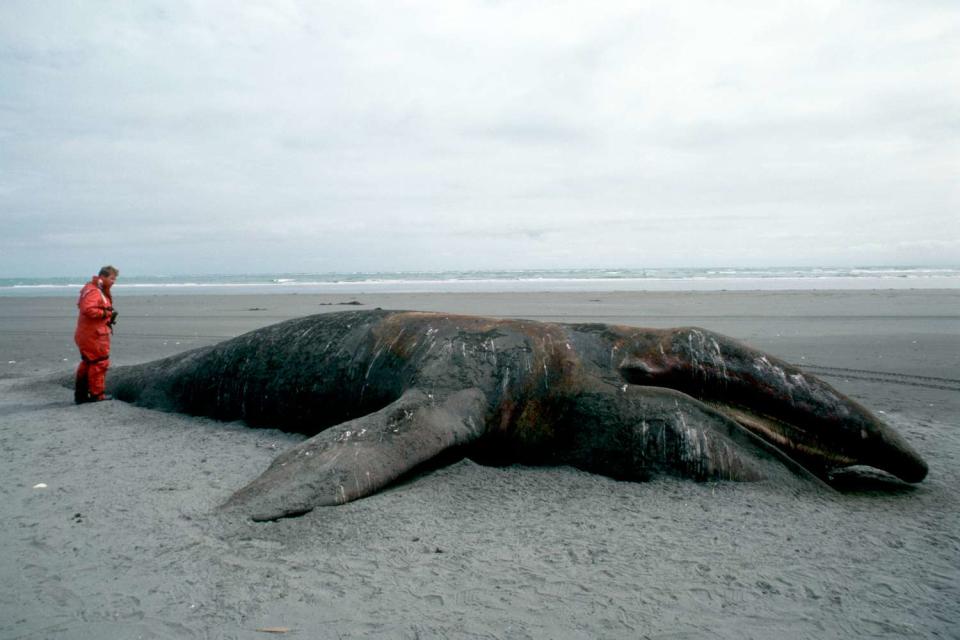Scientists Believe They've 'Cracked the Case' of Why Gray Whales Keep Washing Up Dead in North America
A new study from Oregon State University researchers finds that the deaths may be related to Arctic conditions

Natalie Fobes/CORBIS/Corbis via Getty
Gray whale lies on the beach of Kodiak Island in Alaska.A new study from Oregon State University researchers has looked into why gray whales have continued to be found dead in North America in recent years, and they think they've "cracked the case."
Published on Thursday in the journal Science, the study looks into why gray whales have washed up or been found dead at an alarming rate, and notes that population booms and busts may be a result of Arctic conditions.
“We’ve kind of cracked the case of these big die-offs, and we’ve found they happen more frequently than we expected,” said lead author Josh Stewart, who told NBC News that the population of the whales appears to be connected to how long sea ice blocks their feeding grounds, and the shifting access they have to their prey.
Gray whales feed on benthic amphipods crustaceans, which feed on algae grown under sea ice. But recently, climate change has impacted the growth of the algae, with rising temperatures prompting a decline in sea ice, per NBC News. And while that decline allowed more access to the algae, the outlet also notes that it's reduced the food quality.
“They’re not making as good a living,” Stewart, assistant professor at the school's Marine Mammal Institute, told the outlet — noting that this decline has greatly impacted the whales' food.
“When you have less sea ice and fewer days of sea ice, you don't get that algae reaching the sea floor to create that productivity that the gray whales need,” he told local NBC affiliate KGW. “We know that the resources that gray whales are relying on — to feed, to make a living, to reproduce — are already heavily impacted by climate change and will continue to be increasingly impacted by climate change.”
Related: Gray Whale Gives Birth in Front of Boats Filled with Amazed Onlookers in California — Watch!
According to the study, two mass death events for gray whales could also be linked to sea ice variability, including one event in the late 1990s, per NBC News. For the study, Stewart's team looked at long-term monitoring programs over the last five decades, and compared data from the species' boom and bust cycles to their access to food.
Gray whales, who feed in the Arctic during the summer after migrating from the coast of Mexico, only do so for about four months before fasting for much of the remainder of the year. And as Stewart explained, the animals "really have to gorge themselves for those four months."
The most recent "unusual mortality event" for gray whales, which is how the National Oceanographic and Atmospheric Administration classifies it, is different than previous events as those "only lasted a couple of years," per Stewart.
“The most recent mortality event has slowed and there are signs things are turning around, but the population has continued to decline," he told KGW. "One reason it may be dragging on is the climate change component, which is contributing to a long-term trend of lower-quality prey.”
“They're resilient animals. They're adaptive,” he added. “They can change the areas that they feed in. So I'm not worried about them going extinct.”
Still, Stewart told the outlet that fans of the species should get used to seeing less of them. “We're going to be increasingly living in a world where we're going to have to deal with these impacts that are hard to reverse and have really significant effects on species that we care a lot about,” he said. “And that's a hard thing to stomach.”
For more People news, make sure to sign up for our newsletter!
Read the original article on People.

